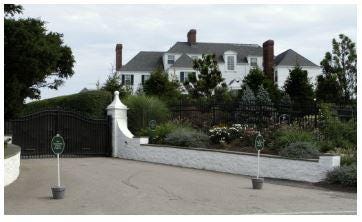The House on the Hill

Taylor Swift surprised the music industry and fans alike this week when she released a new album without her typical build-up, hype and fanfare.
“Most of the things I had planned this summer didn’t end up happening, but there is something I hadn’t planned on that DID happen,” she wrote on Instagram. “And that thing is my 8th studio album, folklore. Surprise”
Perhaps most interesting to Rhode Island readers will be her song, “The Last Great American Dynasty” where she recounts the history of her Westerly home.
The song focuses on Rebekah Harkness, a divorcee who famously married into the Standard Oil fortune in 1947, and patron to several New York City dance companies. Swift writes:
Bill was the heir to the Standard Oil name and money
And the town said, "How did a middle-class divorcée do it?"
The wedding was charming, if a little gauche
There's only so far new money goes
They picked out a home and called it "Holiday House"
Their parties were tasteful, if a little loud.
Holiday House is the name of Swift’s Watch Hill mansion.
The lyrics go on to highlight some of Harkness’ more famous antics, which include cleaning her pool with Dom Pérignon, dyeing a pet green, and her relationship with artist Salvador Dali.
Rebekah gave up on the Rhode Island set forever
Flew in all her Bitch Pack friends from the city
Filled the pool with champagne and swam with the big names
And blew through the money on the boys and the ballet
And losing on card game bets with Dalí
The underlying tension within the lyrics focuses on Westerly’s perception of this “madwoman.”
There goes the maddest woman this town has ever seen
She had a marvelous time ruining everything
Harkness certainly is hard to pin down by modern standards. “Blue Blood,” Craig Unger’s 1988 biography, details her life. Its subtitle: “The story of Rebekah Harkness and how one of the richest families in the world descended into drugs, madness suicide, and violence.”
Still, a New York Times book review wonders, “It might also have been interesting to see how a feminist writer would have assimilated the facts of Rebekah Harkness's sorry life. Might Mrs. Harkness be seen as a casualty of her own doomed and defiled expectations? Unfit for mothering, unfit for ordinary love, unfit — untrained — to be the caretaker of a great fortune, was she altogether silly or altogether bad? Was she power or pawn? And how in the world did she get that way?”
As the song concludes, it turns, juxtaposing Swift’s ownership of the house with Harkness’ — thematically linking the two “loud women” and their relationship with Westerly.
Fifty years is a long time
Holiday House sat quietly on that beach
Free of women with madness, their men and bad habits
And then it was bought by me
Who knows, if I never showed up, what could've been
There goes the loudest woman this town has ever seen
I had a marvelous time ruining everything
Two notable elements where Swift has taken creative license:
First, it was a cat that Harkness dyed green, not a dog.
Second, while Harkness may have developed a somewhat fractious relationship with the rest of Westerly, Swift clearly adores her adopted ocean oasis.
During an appearance on the “Ellen” show last year, Swift was quick to say that Rhode Island was her favorite place in the world to go on holiday.
The town is clearly thrilled that she’s there as well, one local said — "I just hope that as a neighbor, she will be here for a while.”
Whitman Littlefield is The Journal’s digital editor.
wlittlefield@providencejournal.com
